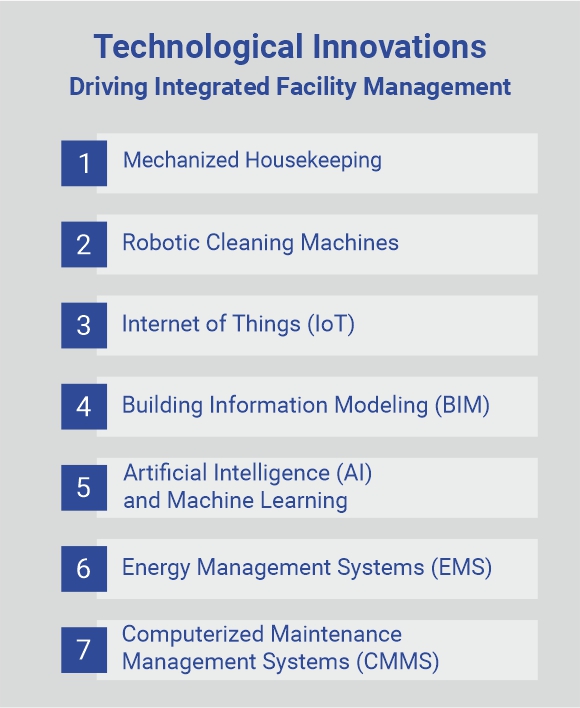Introduction :
Facility management (FM) has undergone significant transformation over the decades, evolving from basic maintenance tasks to a sophisticated, integrated approach that involves a wide range of services designed to enhance the operational efficiency and sustainability of facilities. This evolution has been driven by technological advancements, changing business needs, and an increasing focus on sustainability and cost efficiency.

Traditional Facility Management
In its early days, facility management was primarily focused on basic maintenance tasks. These included cleaning, repairs, and general upkeep of buildings. The approach was largely reactive, addressing issues as they arose rather than anticipating and preventing them. Facilities managers were often seen as the caretakers of buildings, ensuring that everything was in working order but without a strategic role in the organization.
Traditional facility management was characterized by:
- Reactive Maintenance: Problems were addressed only when they became apparent, leading to higher costs and downtime.
- Siloed Operations: Different aspects of facility management, such as cleaning, security, and maintenance, were managed separately without a cohesive strategy.
- Manual Processes: Most tasks were performed manually, and record-keeping was often paper-based, making it difficult to track and analyze data effectively.
- Limited Scope: The focus was primarily on the physical aspects of the building, with little attention given to the overall impact on organizational efficiency or employee productivity.
The Shift to Preventive and Predictive Maintenance
As businesses began to recognize the importance of maintaining their facilities proactively, the concept of preventive maintenance emerged. This approach involved regular inspections and maintenance tasks to prevent issues before they occurred, reducing downtime and extending the lifespan of building systems and equipment.
Predictive maintenance uses real-time data from sensors and other monitoring devices to predict when equipment is likely to fail, allowing for timely intervention. This approach not only reduces downtime but also optimizes maintenance schedules and resource allocation, leading to significant cost savings.
Predictive maintenance uses real-time data from sensors and other monitoring devices to predict when equipment is likely to fail, allowing for timely intervention. This approach not only reduces downtime but also optimizes maintenance schedules and resource allocation, leading to significant cost savings.
The Emergence of Integrated Facility Management (IFM)
The evolution from traditional to integrated facility management represents a holistic approach to managing facilities. Integrated Facility Management (IFM) combines all aspects of facility management into a cohesive strategy, often managed by a single provider. This approach aligns facility management with the overall goals of the organization, ensuring that all services work together to enhance efficiency, productivity, and sustainability.
Key characteristics of IFM include:
- Centralized Management: A single point of responsibility for all facility management services, leading to better coordination and communication.
- Strategic Alignment: Facility management strategies are aligned with the organization's overall goals, enhancing business performance and supporting core operations.
- Data-Driven Decision Making: Advanced technologies and data analytics are used to monitor and optimize all aspects of facility management, from energy use to space utilization.
- Sustainability Focus: Integrated approaches prioritize sustainability, incorporating energy-efficient practices, waste reduction, and green building initiatives.
- Enhanced User Experience: By focusing on the needs of building occupants, IFM aims to create environments that improve employee satisfaction and productivity.
Technological Innovations Driving IFM
The transition to IFM has been significantly accelerated by technological advancements. Some of the key technologies that have transformed the facility management industry in India include:
- Mechanized Housekeeping: Mechanized housekeeping surpasses manual housekeeping by significantly improving efficiency, consistency, and effectiveness while reducing labour costs and minimizing human error.
- Robotic Cleaning Machines: Robotic cleaning machines enhance facility management by providing consistent, efficient, and thorough cleaning, operating autonomously to reduce labour costs, improve productivity, and ensure high standards of cleanliness while freeing up staff for more complex tasks.
- Internet of Things (IoT): IoT devices enable real-time monitoring and control of building systems, providing valuable data for predictive maintenance and energy management.
- Building Information Modeling (BIM): BIM provides a digital representation of the building, facilitating better planning, design, and management of facilities.
- Artificial Intelligence (AI) and Machine Learning: AI and machine learning algorithms analyze vast amounts of data to identify patterns, optimize operations, and predict maintenance needs.
- Energy Management Systems (EMS): EMS monitors and controls energy use in buildings, helping to reduce consumption and costs.
- Computerized Maintenance Management Systems (CMMS): CMMS streamline maintenance processes, track work orders, and manage inventory, improving efficiency and accountability.
The Future of Facility Management
The future of facility management lies in further integration and innovation. As technology continues to advance, the possibilities for optimizing facility operations are endless. Some emerging trends include:
- Smart Buildings: Buildings equipped with advanced sensors, automation systems, and AI to optimize all aspects of operation, from energy use to occupant comfort.
- Sustainable Practices: Increased focus on sustainability, with green building certifications and eco-friendly practices becoming standard.
- Workplace Wellness: Enhancing the physical and mental well-being of building occupants through better design, air quality, lighting, and amenities.
- Resilience Planning: Preparing for and mitigating the impacts of climate change, natural disasters, and other disruptions through robust facility management strategies.
Conclusion
The evolution of facility management from traditional to integrated approaches reflects a broader shift towards efficiency, sustainability, and strategic alignment with organizational goals. As technology continues to transform the industry, facility managers must embrace innovation and integration to stay ahead. Integrated Facility Management service provider companies like FFServices Pvt Ltd demonstrate the benefits of adopting an integrated approach, delivering enhanced service quality, cost savings, and improved sustainability. The future of facility management is bright, with endless possibilities for creating smarter, more sustainable, and productive environments. Experience the peace of mind that comes with superior facility management. Contact us now and let's create a tailored strategy for your needs.
Industries we serve:
Automobile | Manufacturing | Pharmaceutical | Oil and Gas | Healthcare | Ancillary | FMCG | Education | Real Estate | Commercial | Mining | Hotels
Also read: Enhancing Workplace Positivity: The Role of Facility Management Solutions

